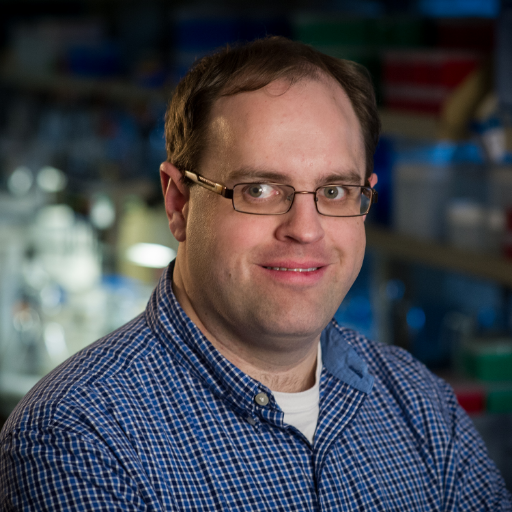Funding Summary
Dr. Potts and his team have studied cells from PWS ‘baby teeth’ to identify changes in cellular function in PWS. They found that the vesicle recycling is altered in PWS cells, and that this is a consequence of loss of the gene, MAGEL2. They also described that developmental changes in cells from children with PWS compared to typical children. In their second year of funding, they will characterize and quantify these developmental changes, in order to not only understand how PWS genes work at the cellular level, also working towards developing a platform to screen drugs that might help restore normal function in PWS cells.
Dr. Theresa Strong, Director of Research Programs, shares details on this project in this short video clip.
Watch the full webinar describing the 9 research projects funded in this grant cycle here.
Lay Abstract
MAGEL2 is a gene frequently deleted or mutated in individuals affected with PWS. Furthermore, mice lacking MAGEL2 display symptoms similar to those seen in PWS children. However, a critical barrier to our understanding of MAGEL2’s link to PWS has been determining its function within cells. Recently, my group has solved this enigmatic question. We showed that MAGE-L2 functions to prevent aberrant degradation of proteins that normal reside in the plasma membrane. It does so through the specific modification of another protein, called WASH. This modification, termed ubiquitination, activates the WASH protein that facilitates recycling of proteins sparing them from aberrant degradation in the lysosome, the garbage can of a cell.
In year 1 of this proposal, we aimed to determine whether MAGEL2’s function in endosomal recycling is observed in patient-derived primary neuronal cells that originate from dental pulp stem cells taken from discarded ‘baby teeth’. Furthermore, we aimed to determine whether there is a genotype-to-phenotype relationship between the genetic causes of PWS (deletion or uniparental disomy), presence of autism spectrum disorder, and defects in endosomal trafficking. Finally, we aimed to move beyond characterization of the cellular defects of PWS to explore proof-of-principle treatment strategies to rescue endosomal recycling pathways in the hope to discovering new therapeutic avenues. From our studies thus far, we have confirmed that indeed neurons derived from PWS patient cells, regardless of genotype, have defective endosomal trafficking. Furthermore, we can rescue this defect by expression of wild-type MAGEL2. Thus, our findings from year 1 suggest that loss or mutation of MAGEL2 has a direct impact on relevant patient-derived cells.
Having validated this cellular model, we now propose to extend these studies in year 2 to track developmental differences between the generation of PWS and healthy neurons. After the neurons are generated, we will examine and compare their cellular structure and function, including protein trafficking controlled by MAGEL2. We predict that neurons generated from PWS patients may be morphologically different from healthy neurons and show defective protein trafficking. We will also examine novel missense MAGEL2 mutations reported in individuals with phenotypes overlapping with PWS and SHFYNG. These MAGEL2 mutations cause certain PWS and SHFYNG symptoms in affected individuals, but they have not been previously characterized. Together, findings from our study will enable better understanding of the cellular defects in PWS and SHFYNG disorders. Moreover, our work lays the foundation for a disease-relevant cellular model to allow screening of novel therapeutics.
Research Outcomes: Public Summary
Despite a clear association between PWS phenotypes and a loss of gene expression on chromosome 15q, there is still a significant question as to which gene or genes contribute directly to PWS. The two primary candidates that have emerged are the SNOR116 regulatory snoRNA and the MAGEL2 gene, which regulates several cellular functions in neurons. Mutations in MAGEL2 are also associated with a syndrome that has significant overlap with PWS called Schaff-Yang syndrome, confirming that it may be a good candidate for driving at least some of the PWS phenotypes. In this study, we used a unique resource developed by the Reiter lab, neurons made from patient derived dental pulp stem cells, in collaboration with the Potts lab to tease out defects in PWS neurons specifically related to the loss of MAGEL2. For neurons to function properly they must recycle and produce signals to other neurons called neuropeptides. Defects in these neuropeptide signals could be a major cellular defect related to PWS phenotypes including intellectual disability and hyperphagia. Here we show that loss of MAGL2 in human neurons from PWS patients results in a loss of the production and recycling of these signals in PWS neurons, but not in neurons from the oppositely imprinted disorder Angelman syndrome, which is caused by loss of expression of the UBE3A gene at this same gene locus. The end result of these MAGEL2 regulated defects is a reduction in neuropeptide production, decreasing the signals between neurons. Our study not only reveals a new cellular defect in PWS, the loss of neuropeptide signaling in PWS neurons, but also provides new avenues for designing therapeutic approaches to the treatment of PWS through the rescue of these cellular defects.
Research Outcomes: Publications
Emerging roles of the MAGE protein family in stress response pathways. Gee RRF, Chen H, Lee AK, Daly CA, Wilander BA, Fon Tacer K, Potts PR. (2020) Journal of Biological Chemistry. doi: 10.1074/jbc.REV120.008029
Loss of MAGEL2 in Prader-Willi syndrome leads to decreased secretory granule and neuropeptide production. Chen H, Victor AK, Klein J, Fon Tacer K, Tai DJC, de Esch C, Nuttle A, Temirov J, Burnett LC, Rosenbaum M, Zhang Y, Ding L, Moresco JJ, Diedrich JK, Yates JR, Tillman HS, Leibel RL, Talkowski ME, Billadeau DD, Reiter LT, Potts PR. JCI Insights. 2020;5(17):e138576.
Funded Year:
2019
Awarded to:
Ryan Potts, Ph.D
Amount:
$108,000
Institution:
St. Jude
Researcher:

Ryan Potts, Ph.D




